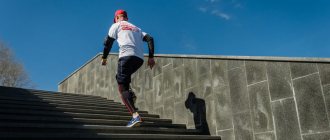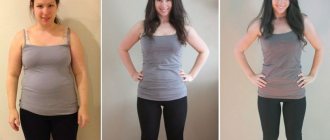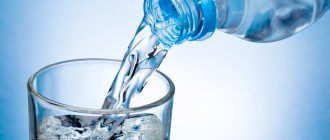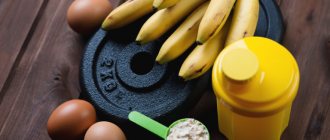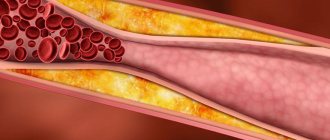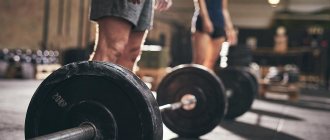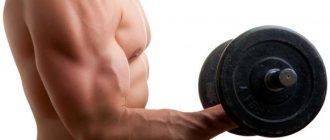On a scale of 1 to 10, post-workout nutrition deserves a 10, while the workout itself is about a 7. That's how important this is if you want decent results. At least that's what the majority thinks. For example, on leg day you can do squats or leg presses, or a combination of different exercises, and any of these options will stimulate muscle growth. But one key factor must be present, otherwise all these efforts will be useless. We are talking about food - proteins and carbohydrates. Without proper nutrition, muscles will not grow. In fact, without food, all these sets of exercises for the chest, shoulders, biceps and even cardio will only lead to muscle loss. The principle is very simple: food intake, in this situation, is more important than physical activity itself. This is why post-workout nutrition is so important. And this is where people make a lot of mistakes.
A little physiology
During exercise, muscles begin to break down immediately after lifting the first weight. This process is called catabolism. It continues throughout the entire training session. It's quite hard to believe, but research shows that catabolism is even greater after exercise than during exercise. Therefore, if you don't start eating immediately after finishing strength training, it will have a negative impact on your results. Perhaps you exercise in the morning in a fasted state in order to burn more fat. So, studies show that catabolism after “hungry” training is much more pronounced. This means that you are burning fat, but at the same time you are burning muscle mass.
Muscle breakdown is a natural response to training load. And that's actually not a bad thing. But in terms of gaining muscle mass, it can be a major obstacle when muscle breakdown outpaces muscle recovery. This can also happen when you are in a state of overtraining. However, what can happen more often is that you simply don't eat enough to stop muscle breakdown. There are two possible options:
- Recovery slower than breakdown = weight and muscle loss.
- Regenerative capacity faster than breakdown = muscle tissue growth.
The body's ability to repair muscle tissue after exercise can only be improved through post-workout nutrition. Some people sometimes blame bad genetics when their problem is a poorly planned post-workout diet. Let's talk about this.
Protein after workout
Everyone who trains hard, but cannot boast of special results, has one thing in common: a lack of understanding of the role of protein. After physical activity, it is needed in order to reduce catabolism. And here a number of problems may arise:
- Some people are afraid to eat too much protein.
- The idea that protein is important is advertising and marketing.
- Vegetarians do not eat meat at all.
When the results are much worse than expected, the most likely reason for this is a lack of protein in the diet. One study was published in the American Journal of Physiology. Participants did heavy leg training and were then given either a solution of essential amino acids, a solution of non-essential and non-essential amino acids, or a placebo (a solution containing nothing beneficial). There were no results in the placebo group. The remaining two showed the same, significant increase in muscle mass. The researchers concluded that it is the intake of essential amino acids that stimulates protein synthesis in muscles. And its consumption accelerates sharply in the post-training period.
So how much protein do you need in your post-workout diet? Most studies show that consuming 20 grams of protein post-workout accelerates the synthesis of protein molecules in muscles. A smaller amount does not have the same effect. This is a good starting point.
It is logical to assume that with more intense training loads a larger amount will be needed.
This was confirmed by a study published in the Journal of the American College of Nutrition. In addition, they found that the age and weight of the athlete also play a role. And this is quite reasonable, because it cannot be that a 60 kg girl and a 100 kg man need the same amount of protein in their post-workout nutrition. In some situations, big guys may need up to 40-50 grams of protein after particularly intense exercise. It can be consumed as whey protein or as traditional cooked chicken breast.
What other possible protein nutrition options are:
- lean meat;
- egg white (in the form of an omelet or boiled);
- protein cocktail;
- turkey fillet;
- Fish and seafood;
- dairy products and low-fat cottage cheese.
Carbohydrates after exercise
This has previously been the subject of lengthy debate. Is protein enough or does it need to be combined with carbohydrates? Yes, protein after exercise increases protein synthesis. But for maximum results, carbohydrates are also important. There are two reasons for this: glycogen and insulin . Anaerobic exercise such as weight lifting, as well as intense forms of cardio such as HIIT, burn large amounts of glycogen.
And what's the problem? Very low glycogen levels significantly accelerate the process of muscle breakdown (catabolism). In other words, if there is virtually no glycogen left in the body, it becomes much more difficult to stop the breakdown of muscle tissue, no matter how much protein you consume. The fastest way to restore muscle glycogen is to consume carbohydrates. Fast carbohydrates (high glycemic index) such as white rice are a very good source of glucose. And glucose is the body’s most preferred source of energy after intense exercise. Therefore, eating “fast” carbohydrates is the easiest way to restore glycogen and stimulate muscle growth. Another reason to include carbohydrates in the diet after intense exercise is that they cause a large release of insulin. Insulin suppresses the breakdown of muscle fibers (catabolism) and also delivers nutrients (proteins, carbohydrates and fats) to the body's cells. In other words, it is a very important substance in stopping the breakdown of muscle tissue. Protein food itself raises insulin levels. However, when combined with carbohydrates, it causes a rise and keeps the level elevated much longer. The more intense the training, the more important this is.
Let's summarize. A typical strength training session should last 45-60 minutes. As a result, glycogen stores will sharply decrease. After finishing the exercise, it is recommended to eat the largest amount of carbohydrates per day (and this will not cause fat deposition in the body). For example, one of the best options: 60-100 grams of white rice as a source of “fast” carbohydrates.
Other carbohydrate foods:
- buckwheat (porridge);
- oatmeal (porridge);
- millet groats (porridge);
- durum wheat pasta;
- fresh juice (watermelon, pomegranate, etc.).
After intense exercise, 1 gram of carbohydrates per 1 kilogram of body weight is recommended.
Therefore, how much carbohydrates to eat depends on your weight and intensity of exercise.
Food and training what is the time interval between them
01/20/2018 from people-sport.com // Category: Good to know, Tips //
A person at any age dreams of a beautiful and fit body. This result can only be achieved through a combination of training and proper nutrition - and this combination must also be correct. The body must not only receive everything it needs, everything must be done on time
And athletes know the importance of the regime, observing it scrupulously
Why can't you start training immediately after eating?
All explanations for this are based on the practical side of the issue. So, by starting classes after eating, you can get:
- Heartburn. Since the digestion process is disrupted, at a minimum, unpleasant sensations appear in the stomach, which can easily intensify to heartburn.
- Vomiting is caused by very dense food, which was eaten immediately before entering the gym, if immediately after that you begin to lift weights or bend over.
- A decrease in the effectiveness of exercise, since immediately after eating a person’s brain receives signals inducing rest, that is, if not taking a nap, then at least wanting to sit. And as a result, the trainee is lazy to perform the exercises at full strength, gets tired too quickly and spends a minimum of effort on a minimum of approaches. Do you want to relax or use your phone? This food makes itself known.
- Preservation of the fat layer. The fact is that after food has entered the stomach, the body produces serotonin, which both relaxes and blocks a process important during training - the breakdown of fats. The result is natural - if the goal of training is to lose weight, you will not be able to achieve it.
- And finally, the process of digesting food becomes difficult, since the muscles “divert” blood from the stomach. The body reacts to this by constricting blood vessels, causing additional difficulties in all body systems, especially the cardiovascular system.
How long should you wait after eating before going to exercise?
It is definitely not recommended to go to the gym as soon as you get out of bed. Breakfast beforehand is required. If you don’t have time to digest something dense, you can use a little trick: apples or peaches are also food, but they will be digested in 15 minutes. Just don’t take bananas as a pre-workout food - they raise blood pressure, which can cause a severe headache after several approaches.
A hearty lunch means that the workout will begin at least an hour after it, and even better - after a couple of hours. The fact is that this meal consists of different foods - with, accordingly, different digestion times.
The easiest way is to calculate the time depending on the severity of the expected loads: if they are at a high level, then you need to wait three hours, if they are medium - two, if they are low - an hour will be enough.
You also need to focus on your diet: people who eat heavily three times a day should wait three hours, or better yet, more. The time when you can start training will be told by your stomach—more precisely, by the absence of a feeling of heaviness in it.
Those who eat small and frequent meals get into ideal training shape an hour and a half after they last ate.
After the workout, the so-called anabolic window is formed - this is a happy 20 minutes when any food (excluding fast food and something very fatty) will not harm the figure and will be digested as quickly as possible. The exception is bodybuilding, in which case a special diet applies.
Health and beauty are just around the corner - in the gym! By timing your pre-workout meals, it's easy to achieve amazing results.
Is there a post-workout protein-carbohydrate window?
When it comes to post-workout nutrition, everyone remembers the “protein-carbohydrate window.” Some experts say that there is 30 minutes after finishing a workout in order to maximize muscle fiber synthesis. Others say 60 minutes. Overall the idea is quite simple. This is a short “window” of time when you can actively influence the effect of your workout using nutrition. Does it exist? Most people tend to think that there is no difference. The main thing is to start eating within 60-90 minutes after training. If this “window” exists, it means we are using it effectively – closing it. And if it’s not there, we eat protein foods and carbohydrates to stop catabolism and stimulate muscle growth. We win in both situations. But if you do not eat enough food during this period of time, then there is a risk that all your efforts will go in vain. And now about the “protein-carbohydrate window”. Many do not believe in it and claim that there is no difference when to consume protein and carbohydrates. All that matters is the total amount of essential nutrients for the entire day. But there are many studies that prove that athletes who consumed protein-carbohydrate foods within half an hour after training achieved better results.
The total amount of protein you consume per day is extremely important for muscle growth. For example, if you weigh 200 pounds and only consume 90 grams of protein per day, it won't really matter if you consume it immediately after your training session. It is unlikely that you will be able to gain muscle mass. From a muscle growth physiology perspective, consuming both carbohydrates and protein within 60-90 minutes of finishing an intense exercise increases your chances of achieving better results.
After how long to exercise: diet
Diet for athletes is no less important than the quality of food.
This is why many people are interested in how long after eating to exercise. The answer to this question lies in the size of your portions. For example, you eat heavily three times a day, and in this situation you should start exercising no earlier than a couple of hours later. This time will be enough for the body to process all the food. People using a fractional diet plan eat more than three times a day, but use small portions. In this situation, training can be carried out 60 minutes after eating.
Note that this recommendation is not universal, since the time of day when you play sports is also quite important. If your workouts are carried out in the morning, then you can start exercising 40 minutes after breakfast. This is due to the fact that in the morning the body is highly efficient and food is processed fairly quickly. However, there is one caveat here - the food consumed is quickly digestible and light.
If you are limited in time and cannot have a normal breakfast, then you can drink a glass of tea or compote and start training after 30 minutes. When classes are scheduled for the afternoon, you should wait at least an hour and a half after taking your food.
When talking about how long after eating to exercise, we should not forget about several other factors: the individual characteristics of the body, the type of physical activity, its duration and intensity. Let's say a marathon runner with a body weight of 70 kilos, who covers long distances every day, should eat differently than a girl who trains only once a week to maintain her figure.
Very often people are interested in the question of how much food can be consumed before an exercise aimed at losing weight. Here you should remember the basic principle under which lipolysis is possible - you need to spend more energy than you receive. However, the energy value of your diet should be sufficient to ensure the performance of all body systems.
You must understand that if the calorie deficit turns out to be excessive, your metabolism will slow down dramatically. In this situation, there is no need to talk about any fat burning. No matter what kind of sport or how intensely you do it, with slow metabolic processes the body will not burn fat.

